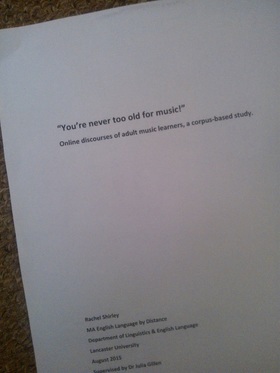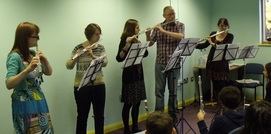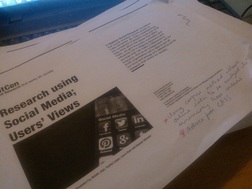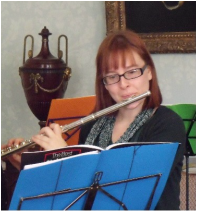 One size doesn't fit all - gigantic wind band fleece! One size doesn't fit all - gigantic wind band fleece! In my last post, I talked about the value of taking different approaches to playing musical instruments, and trying them out to find the best ones for you. In a way, the tendency to try to find 'one size that fits all' is one of the things that led me to want to research adult music learners. It was the attitude that I'd sometimes come across that "adult learners are... X". One of the first results that came up when I searched online was a quote from a music teacher saying that "adults are notoriously difficult to teach". My own experience suggested that wasn't necessarily the case, but it did start me wondering about whether adults learning did have many common characteristics, or whether they were really quite diverse (my 'work in progress' answer to that, from my research so far, and from teaching increasing numbers of adults, is probably 'both'!). My reading of adult learning literature is bringing up issues around what exactly that constitutes - the research I've looked at so far tends to focus on 'basic skills' education or, to a lesser extent, retraining, which is quite a different sort of experience to learning an instrument, although clearly there will be overlaps in the basic issues around 'learning'. But it has got me thinking about where music education sits in all this - there are plenty of debates around how important it should be considered in schools, but what actually is music education for adults? Certainly it's rare, though not impossible, for someone to take up an instrument in later life and become a professional musician - setting aside for now how we define a 'professional musician' because that's a whole other can of worms! - so it's not, generally, 'retraining' for a new career. Is it a hobby, or leisure activity? It does feel somehow different from hobbies where you perhaps attend a term of evening classes, or go along once a week to a club (and I always feel the word 'hobby' has a sense of casual interest, which doesn't quite fit how some adults treat their music - or indeed other non-work activities). I do think that music teachers need to take account of those different attitudes - what someone needs from lessons varies depending on what they want out of them. Some adults seem to start with a clear idea of what they're aiming for, whilst others don't so much, and that's also part of our job, to support them in finding out what that is and as it might change along the way (or maybe never quite finding out exactly, but enjoying the process). Some of my Masters research found adult students being pressured down the exam route by teachers, and maybe that's an example of trying to use the same approach for everyone. I've also read some discussion this week about how long it should take learners to reach certain stages on an instrument, and I think that's definitely a topic for a future 'one size fits all' post, which seem to be turning into an accidental series. More soon!
0 Comments
 Yesterday, I submitted my MA dissertation online. Today the hard copy is being bound and tomorrow I'll post that off to the department. So I've reached the end... sort of. Although I've no more work to do on the Masters, I will be waiting (slightly anxiously, as mentioned previously, I'm not good at waiting for results!) until October for the final mark. Then graduation is in December so after that it's definitely, really finished! The last few weeks of bringing it all together have been stressful, but also hugely enjoyable to see it take its final shape. Despite times when I thought it would never turn into anything resembling a dissertation, I've found the whole process incredibly fulfilling. I have to say a big thank you to my wonderful supervisor, Dr Julia Gillen, for her guidance, enthusiasm for the project, listening to me rambling on (when you're a distance learning students the odd occasions when you actually get to visit your University and talk about your research are terribly exciting!*) and for giving me the confidence that I could actually do this thing! It does feel very strange to be at the end - I've done the course part-time over three years and the dissertation has been slowly growing from an embryo of an idea early last year, so it has occupied my brain for quite a long time! I don't, however, feel like I'm finished with the research yet. The final product only used about half of my original plan - who'd have thought that a 12,500 word limit actually isn't that much! So while I did look at how adult learners talk about being 'older' and how that affects their learning, and what they say about music exams, music teachers and their families' involvement/ impact on music learning, there are whole areas which I started looking at but couldn't cover in detail - how they talk about being 'musicians' or not, whether there are any patterns in how they use modality (e.g. will vs might), what other grammatical patterns there are and what these might imply. I've covered how emotions are portrayed around exams and teachers, but there is so much more to say about that, including looking at how emoticons are used in the online text to portray moods and emotional reactions. I'd like to look at text written by teachers about adult learners and see how that compares under the same sort of analyses - what discourses are evident in that and are they the same as the ones that came out of my corpus of text written by adult learners themselves? (I suspect they won't match up completely - I certainly found from my survey that teachers talked about 'skills' needed to teach adults, whereas in the corpus adults described the 'qualities' of their teachers). I'm interested to find out how different the concerns of adult learners are to younger learners. I wan't to know what it is that makes some adults more motivated, or more independent at learning - are there any connections with their previous musical experiences (learning as a child or not, etc), or the style of music they're learning? Are there different discourses of adult music learners in different cultures or countries? Is this starting to sound like a lifetime's work to follow up all these loose ends? I suspect it is! For now though, while the research is all still very fresh in my mind, I'm looking at trying to take some of my research out there into the big wide world - as a poster or presentation at conferences, hopefully at some point as an article somewhere. I will be putting it online once it's marked, and discussing my findings a bit more on here too. I'd like it to reach the people it actually makes a difference to - adult learners themselves, teachers and the people who train teachers - so will be thinking about how to share it with them too. And since I now have a little bit more spare time, I'll be setting myself a few new musical goals... watch this space! (*I would also like to thank all the other people who have patiently listened to me rambling on about it over the last year, whether they were really interested or not. You know who you are!)  This week is NIACE's Adult Learners' Week - obviously highly relevant to my MA research and my interests. The Associated Board of the Royal School of Music (ABRSM) estimates that over 17m UK adults play an instrument, with 2.5m of those attending music lessons. A recent survey of adults discovered that playing a musical instrument is second (only to cooking) in the list of skills people would like to learn. I've been asked what the point of my research is (has any researcher NOT been asked that?!) and that is part of the point - with so many people playing, learning or wanting to learn an instrument, how do we best cater for their needs? Finding out what they say and think about learning music is, I think, vital to shaping music education that works for adults. One common theme in existing studies on adult music learners is the influence of teachers - how a 'bad' experience with a teacher can put off someone from learning an instrument. Often this happens at a young age, and part of the job of teachers working with adult 'returners' can be to help them renegotiate their relationship with music - change the way they think of themselves in relation to playing an instrument and indeed 'being a musician'. On the other hand, existing research also shows the wonderfully positive influence of good teachers, at all ages, in fostering lifelong love of music and confidence in taking part in musical activities. A major part of my dissertation looks at how adult learners describe their teachers and their relationships with them. My teacher survey revealed that teachers recognise there is a difference between teaching adults and children, and talk about a different set of 'skills' that are needed - an ability to adapt to different learning styles and challenges, different ways of communicating, and mentions of confidence-building, empathy and understanding. The results of my corpus analysis, searching for how learners talk/ write about teachers, suggest that learners don't describe these things as 'skills', but are tend to describe teachers' characters and how they make them feel. As a brief snapshot, some of the collocates (words appearing in juxtaposition with teacher(s)) I've been writing about this morning include horrified, dreaded, nags and traumatised on the negative side, and thrilled, magnificent, inspires and encouragement on the positive. Some fascinating metaphorical language appears including rotting, shreds, whip, ogre, flogging and murdering (I'm pleased to say that doesn't all refer to one particular teacher or lesson)! Overall, it's suggesting that music teaching very much needs to pay attention to that customer service adage about "how you make people feel". This coming weekend, I'm running a workshop for my students along with Sheffield Flute Choir (a group I run for adult players), followed by an informal concert in front of their family and friends. Participants range in age from eight up to approaching retirement. For some of them, including several adults who took up the flute just this year, it will be their first time playing in front of anyone other than me and whoever shares their home. I'm hoping it's an experience that leaves them feeling inspired and encouraged.  In my last 'MA Research' post, I explained that my research is based on a corpus (basically a database) of text written by adult learners. Today's post is about where I got that text from, the ethical implications of that, and the decisions that led me to make about how to use the text. Existing studies of adults learning music tend to use techniques such as interviews or surveys to find out what these adults think about their experiences. Stephanie Pitt's fascinating recent book, Chances and Choices, which looks at the impact of music education on lifelong musical involvement, is based on research which asked participants to write a musical 'life story' - an autobiography of their musical experiences, and this includes the experiences of adult learners. These studies give us valuable and detailed insight into the thoughts of adult learners - but only a small group of them, who have chosen to take part in a research project. To try to access a bigger group of adult learners, I turned to one of the biggest sources of text around - the internet. People write online - in forums, blogs, discussion groups, etc - about learning music as an adult. They compare their experiences, ask each other questions, discuss their problems and successes. The internet gives us access to a huge amount of text, and the corpus approach is perfectly suited to analysing it. It can be downloaded from web pages, turned into plain text, 'tidied up' (the time-consuming bit, removing extraneous text such as sidebars or forum headings), then fed into the corpus analysis software, ready to explore. My data consists of a 500,000-word corpus of such text. Perfect? Not completely. Just as existing studies are only analysing responses from those who've chosen part in their research, this approach only analyses texts from people who post online. So it's not exhaustive, and maybe there is potential to combine the two approaches in future (one of the aims of my project is to see whether my results complement or differ from existing studies which have used different methods). The other, bigger, issue is an ethical one. In 'traditional' research, participants are normally informed about what they're doing, give consent, and are aware that what they're writing is being used for research purposes. Internet research is still a fairly new field, and the ethical guidelines there aren't quite so clear-cut. One the one hand, there's the position that participants should be informed and give consent in the traditional way. On the other, two arguments. Firstly that (unless password-protected) this information is already in the public domain, so is available to 'use', much like analysing an article or a letter in a newspaper - but some disagree, saying that people 'feel' that internet communities are private even if they technically aren't, and this should be taken into account. Secondly, and stemming from this idea of 'community', is the idea that announcing you're doing some research on some online text can disrupt that community. People may no longer feel 'safe' to post whatever they've been posting before, or feel that they have to edit their text in some way because of the 'presence' of a researcher (as they might do in a traditional interview/ survey), and so don't use the online 'spaces' in the same way as they did before, to express their thoughts and feelings around a subject, or as a support system. My decision-making on what approach to take was informed by reading about what social media users think about online research (for example, this report from NatCen Social Research). The overwhelming answer from this research and other online research guidelines is... it depends (on the type of research, the type of website or social media, the topic of the research). But the main guidance is to make sure you've considered the issues and come up with an approach that takes these into account. Corpus linguistics helps us out again here (and thank you to researchers at the ESRC Centre for Corpus Approaches to Social Sciences for advice on this, via my supervisor). Because I'm looking at patterns in the text, for example the terms which are most frequently associated with the word teacher, rather than examining individual participant's responses, I'm able to anonymise the data. I don't mention the sites I've downloaded the data from; I don't include any real names, user names, or identifying details in my analysis, and I'm being particularly careful about the traceability of any quotes. It's not a perfect solution to all the issues, but in research - much like in music - perfection is elusive, perhaps impossible, and not actually necessary. I'm taking an approach that I've thought through and feel comfortable enough with to use (and I've got ethical approval from my department, which is always reassuring!).  Rather like your first music lesson, writing your first blog post can be both exciting and a little nerve-wracking! I’m blogging because I’ve got lots of ideas I want to write about, but this first post is a quick one to say hello, a bit about me and what I’ll be blogging about. So, hello! I’m a flute and music theory teacher, and I also work teaching baby and toddler music classes. Between those, I currently teach music in various forms to people aged between about six weeks and sixty years! I play in local ensembles around Sheffield and Yorkshire, and run a group for adult flute players. I’m also a part-time distance learning student, in the final year of a Masters in English Language with Lancaster University. When I left school, my English teacher wrote in my school yearbook that she hoped I’d enjoyed her classes “almost as much as music”, and the truth is that I have a lifelong fascination with both! I think there are lots of connections and similarities between how we learn and use language and music, the roles they play in our lives. I’m interested in ‘sociolinguistic’ approaches, which examine how language is used to express identity, social relationships and attitudes, and I’m particularly intrigued by how language is used by musicians, musical organisations, music teachers and even in musical tutor books. I’m currently working on my MA dissertation which is about adult music learners. Using linguistic analysis techniques (more about those in later posts), I’m analysing a large data set (or ‘corpus’) which consists of text where adult learners talk/ write about themselves. The aim is to find out the main ‘discourses’ of adult learners. What are their priorities, their challenges, their feelings about learning music? How do they describe themselves and their experiences of learning music? I’ll be blogging about my research and related topics over the coming months. You can also expect posts about flutes, performing, teaching and music in general. Comments are very welcome (but do need to be approved to avoid spam and nonsense, so won’t appear immediately) – I’d love to hear your views! |
Keep in touch
I have an email newsletter where I share my latest blog posts, news from the flute and wider musical world, my current projects, and things I've found that I think are interesting and useful and would love to share with you. Expect lots about music and education, plus the occasional dip into research, language, freelance life, gardening and other nice things. Sign up below! Archives
July 2019
Categories
All
|
 RSS Feed
RSS Feed
